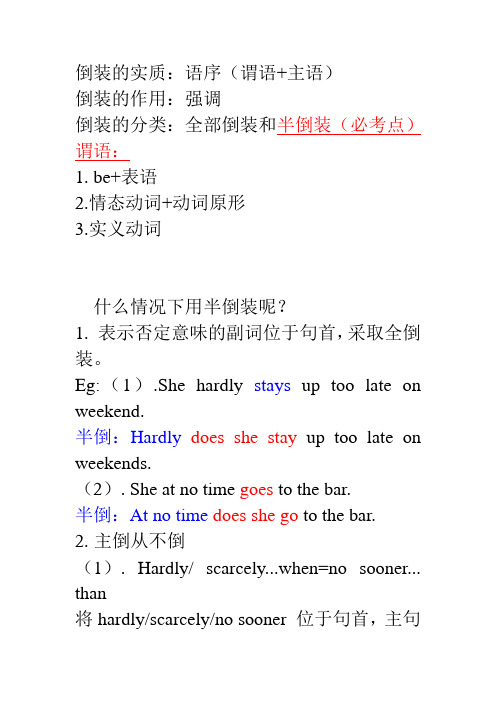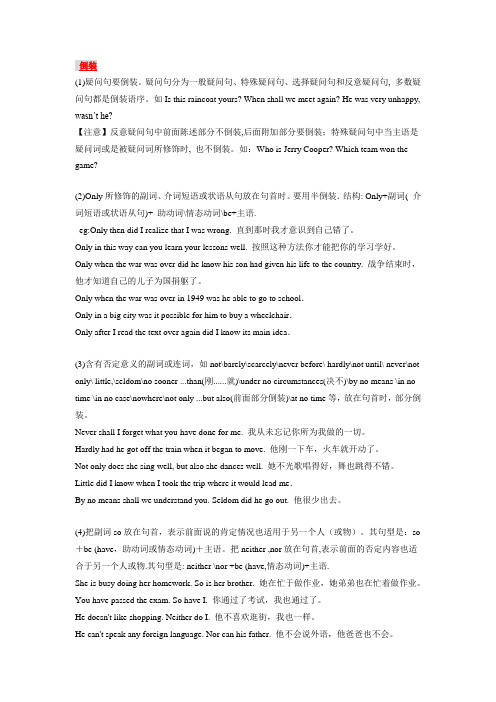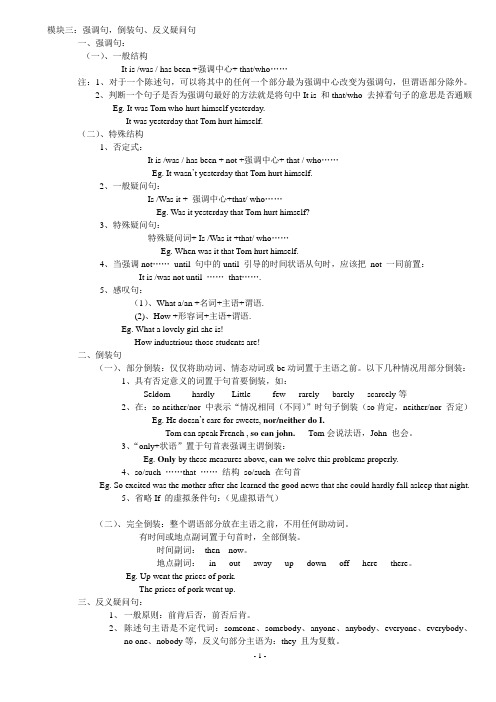(完整版)专升本英语语法专项之倒装专题
专升本倒装句PPT课件

.
29
几种常见的部分倒装结构
6. 当虚拟条件句含有 were, should, had 时,可省略 if,将 were, should, had 置于 句首。
• Were I Tom (=If I were Tom), I would refuse.
如果我是汤姆,我就会拒绝。
.
27
• Tom is an American, but lives in China, it is the same with Jack.
汤姆是美国人,但他住在中国,杰克也如 此。
• —I like chicken, but I don't like fish.
—So it is with me.
• Were my teacher here, he
would give some good advice.
我的老师如果在这儿,他会提些好建
议的。
.
31
几种常见的部分倒装结构
7. 以May…或Long live…开头的某些 表示祝愿的用语。
• May God bless you愿上帝保佑你! • May you succeed!祝你成功! • Long live the people's Republic
他没有看这部电影,我也没有看。
• You aren’t young, and___.
你不年轻, 我也不年轻。
• She hasn’t read it, and___.
她没有读它, 我也没有读。
• neither did I
• neither am I
• nor have I
.
25
专升本英语语法倒装

1。含有否定意义的词或短语放在句首的倒装
never, little, barely, seldom, rarely, hardly, scarcely, nowhere, no, few, nor, neither, by no means, in no case, in no way, at no time, under/in no circumstances, on no account, not until, no sooner …than, hardly …when, scarcely …when, barely …when, not
2。as或though引导的让步状语从句引起的倒 装(注意:不是although)
3。so或such等表示程度的副词位于句首引起 的倒装
4。only+副词、介词短语或状语从句位于句 首引起的倒装
5。虚拟语气中条件句的倒装
6。So(neither, nor)+be (助动词、情态动词) +主语
7。There, here, then, now等表示地点、时间 的副词或介词短语以及 out, in, away, up, bang等表示方位或拟声词位于句首的倒装
only…but also, in vain等
例外
但是,如果句首的否定词否定的是主语则 不引起倒装:Little help can be expected from Peter. Hardly anyone loved the Italians except the French.
如果句首状语的否定意义与后面的另一否定词或 其他词语所抵消,则不引起主谓Байду номын сангаас分的倒装: Not infrequently they go abroad. 他们不是不常去国外。
专升本英语倒装句真题聚焦1

真题聚焦1.Seldom()in such a rude way.(2007)A.we have been treatedB.have we been treatedC.we have treatedD.have we treated【解析】seldom在句首时,句子要倒装,并且“我们”和“对特”之间是被动。
题干译文:我们很少受到如此粗鲁地对待。
故选项B.have we been treated正确。
2.()water resources have been severely wasted or polluted.(2009)A.They are scarceB.Scarce they areC.Scarce as they areD.As scarce they are【解析】本题考点是as表示“让步”,要用倒装。
故选项C.Scarce as they are 正确。
题干译文:尽管它们很稀少,但水资源依然被严重地浪费和污染。
3.So loudly()that all the people in the room got a fright.(2012)A.he shoutedB.shout heC.did he shoutD.he did shout[解析】考查倒装。
so位于句首,句子用部分倒装。
部分倒装是把助动词或情态动词提前,选项C符合条件。
题干译文:他喊的声音如此的大,以至于房间里的每个人都吓了一跳。
故选项C.did he shout正确。
4.-“I don't drink coffee at all.”一“().”(2012)A.So don't IB.I do eitherC.Nor I doD.Neither do I【解析】本题考查倒装句。
首先排除B选项;so和don‘t不能搭配,排除A:两者的否定用neither,排除C。
只有选项D 正确。
题干译文:—我根本不喜欢喝咖啡。
专升本常考英语强调句及倒装句[1]
![专升本常考英语强调句及倒装句[1]](https://img.taocdn.com/s3/m/4733264ce518964bcf847cd7.png)
强调句型It is / was + 被强调部分+ that / who + 其他成分1、It后面的动词be只有is或was两种形式,而没有will be, will have been, were等形式。
用is还是用was 要视原句的时态而定,that / who后面的动词是过去式,用was;是现在或将来式,用is,前后时态要呼应。
如:It was in the street that I saw her yesterday.It is tomorrow that I’m going to Beijing.It is tomorrow that she will meet her father at the airport.2、强调的主语、宾语表示人时,用that, who皆可。
如果是物,常用that。
此外,强调作主语的人称代词时,用主格代词;强调宾语时,用宾格代词。
被强调部分若是原句的主语,who / that之后的谓语动词在人称和数上应与之保持一致,如:It is I who am a student. It is he who is right.It was they who were right.3、强调时间、地点、原因、方式等状语时,不用when, where, why或how等,而用that,例如:It was this morning that I saw Li Ping in the street.It was in the park that I met Li Ping.It was because she was ill that they didn’t ask her to do the job.4、该句型不能用于强调让步状语从句、比较状语从句、以since, as引导的原因状语从句以及表语从句。
It was though it was raining that he went out. ×It is since everyone is here that let’s start our discussion. ×It is an engineer that his father is. ×It is than she that he is taller. ×5、如果原句是一般疑问句,应用“Is / Was it … that …?”形式;如果原句是特殊疑问句,应用“疑问词+ is / was it that …?”这一形式,例如:Was it at eight o’clock that you began to work?What is it that makes this kind of fish different from other fish?How was it that you missed such a fine lecture?6、如果原句含有not…until(短语或从句),变成强调结构时,应把not 和until 一并置于be之后,例如:It was not until I told her that she knew anything about it.It was not until his father came in that the boy began to prepare his lessons.It was not until she took off her dark glasses that I realized she was a famous film star.7、该句型不能强调谓语。
浙江专升本英语语法:倒装讲义

倒装句【考纲解读】倒装句是考试的热点。
近年来命题者加大了对句子结构和知识面的考查,同时注重考查知识之间的交叉和语法知识的力度。
这就要求我们在平时的复习和备考中注意总结,全面把握,深入研究。
倒装句有以下六大考点:(1)含有否定意义的副词放在句首引起的部分倒装(2)含有否定意义的连接词置于句首引起的部分倒装(3)“so(nor, neither)+助动词 + 主语”与“so(nor, neither)+主语+助动词”之间的区别以及与“ so + 主语+ 助动词”的句式区别(4)省略if的虚拟条件句以had / were / should开头引起的部分倒装(5)not until 置于句首引起后面句子的部分倒装(6)only 短语置于句首引起的部分倒装【知识要点】主语和谓语有两种顺序:一是主语在前,叫自然语序。
反之,如果谓语在主语前就是倒装语序,又分全部倒装和部分倒装。
全部倒装是把全部谓语放在主语之前,部分倒装是把助动词或情态动词放在主语之前。
一、全部倒装1.there be 句型:可以用在这类句型中的动词除be外,还可用live,happen,exist,remain,stand 等等作这类句型的谓语。
如:Behind every successful man, there is a woman. And behind every unsuccessful man, there are two.There are many students in the classroom.教室里有许多学生。
Long ,long ago there lived a king who loved horses very much.很久很久以前,有一位国王,他非常喜欢马。
There happened to be nobody in the bedroom when the fire broke out.起火的时候,碰巧房间里面没有人。
英语倒装句型 【专升本必考题型】

倒装的实质:语序(谓语+主语)倒装的作用:强调倒装的分类:全部倒装和半倒装(必考点)谓语:1. be+表语2.情态动词+动词原形3.实义动词什么情况下用半倒装呢?1. 表示否定意味的副词位于句首,采取全倒装。
Eg:(1).She hardly stays up too late on weekend.半倒:Hardly does she stay up too late on weekends.(2). She at no time goes to the bar.半倒:At no time does she go to the bar.2.主倒从不倒(1). Hardly/ scarcely...when=no sooner... than将hardly/scarcely/no sooner 位于句首,主句半倒装,从句不变。
Eg: I had hardly entered the room when I heard the ring.半倒:Hardly had I entered the the room when I heard the ring.总结:Hardly/Scarcely/No sooner +had +主语+done+....when/than....(2).only +副词/介词短语/时间状语从句,主句(be/情态动词/助动词+主语+表语/动词原形)Eg:Only in this way can we protect the environment.Eg: Only when she comes back do I know the news.3.前倒后不倒(1)So/such...that... “如此。
以至于。
”Eg: she is so beautiful that I can not breathe. 半倒:So beautiful is she that I can not breathe.总结:So/such +adj./adv.+be/情态动词/助动词+主语+其他+that 从句(不倒装)真题:So_________ that she has no time to rest.A.Busy she wasB.Busy was sheC.Was she busyD.She was busy(2)Not only...but also...“不仅...而且。
专升本英语语法---倒装

(1)疑问句要倒装。
疑问句分为一般疑问句、特殊疑问句、选择疑问句和反意疑问句, 多数疑问句都是倒装语序。
如Is this raincoat yours? When shall we meet again? He was very unhappy, wasn’t he?【注意】反意疑问句中前面陈述部分不倒装,后面附加部分要倒装;特殊疑问句中当主语是疑问词或是被疑问词所修饰时, 也不倒装。
如:Who is Jerry Cooper? Which team won the game?(2)Only所修饰的副词、介词短语或状语从句放在句首时。
要用半倒装.结构: Only+副词( 介词短语或状语从句)+ 助动词\情态动词\be+主语.eg:Only then did I realize that I was wrong. 直到那时我才意识到自己错了。
Only in this way can you learn your lessons well. 按照这种方法你才能把你的学习学好。
Only when the war was over did he know his son had given his life to the country. 战争结束时,他才知道自己的儿子为国捐躯了。
Only when the war was over in 1949 was he able to go to school.Only in a big city was it possible for him to buy a wheelchair.Only after I read the text over again did I know its main idea.(3)含有否定意义的副词或连词,如not\barely\scarcely\never before\ hardly\not until\ never\not only\ little,\seldom\no sooner ...than(刚......就)\under no circumstances(决不)\by no means \in no time \in no case\nowhere\not only ...but also(前面部分倒装)\at no time等,放在句首时,部分倒装。
英语语法专题倒装讲义和练习及答案

英语语法专题倒装讲义和练习及答案英语的大体语序是“主语+谓语”,若是将谓语的一部份或全数放在主语之前,这种语序叫倒装。
倒装既是一种语法手腕,也是一种修辞手腕,用于表示必然的句子结构或强调某一句子成份。
倒转句的考查主要从以下几个方面入手:1)含有否定意味的词置于句首,部份倒装;2)only+状语/状语从句置于句首,部份倒装;3)so/such…that句型中,so+形容词/副词提前,部份倒装;4)表示方位的副词或介词短语放在句首,要完全倒装。
一.倒装的原因A.语法倒装由于语法结构的需要,将谓语的全数或一部份移到主语之前。
1.一般疑问句当咱们把一个肯定句转变成疑问句时,常把肯定句中的助动词或情态动词放在句首。
这种助动词或情态动词包括:be,have,can,do,shall,will,may,must,dare,need,ought或used 等。
He will do it. ——Will he do it?他会做这件事吗?This is my mobile phone number. ——Is this your mobile phone number?这是你的电话号码吗?提示:若是肯定句中没有助动词或情态动词时,咱们可以在句首用do 的某种形式,以组成倒装语序。
Jack likes to eat fish. 杰克喜欢吃鱼。
——Does Jack like to eat fish 杰克喜欢吃鱼吗?2.特殊疑问句特殊疑问句的组成:特殊疑问词+ 一般疑问句What does he like to eat 他喜欢吃什么?When will they go to the Great Wall 他们何时去长城?Where did you go last night 昨晚你去哪里了?Who is not coming to dinner tonight 今晚谁不来用饭?3. 反意问句在反意问句中,用一般疑问句的形式,前后两分句的主语,人称要一致。
专升本学位英语讲义-强调句、倒装句

第二章-强调句、倒装句第二章常考语法——7.强调句、倒装句强调句强调句是一种修辞手段,通过各种方式对句子中的某个部分进行强调。
只有一般现在时和一般过去时,如:It was not until the teacher came in that students stopped talking.They did give me some help.This is the only book that I am interested in.It引导的部分强调句It的两种基本用法it作形式主语,代替主语从句、动词不定式或动名词短语,被代替的是句子的真正的主语。
It delighted me that I could go to the college that I liked.(作形式主语代替主语从句)It作形式宾语I think it very important to learn English well.(代替动词不定式)It引导的部分强调句it is /was+被强调部分+that/ who+原句其他成分可以用来强调主语、宾语、状语。
如果强调的主语或宾语是指的人,则that可以由who来代替。
如果强调的是状语,则不能用when, where来代替,只能是由that来引导。
如:It is us who/that are taught by Miss Wang.(强调宾语)It is in the class 9 that Miss Wang teaches us.(强调状语)特殊强调:It is/ was not until+被强调部分+that+其他部分It was not until his wife came back that he went to bed.It引导的部分强调句判断是否是强调结构的方法是,去掉it is/was和that后,剩余部分(经调整后)是否依然是个完整的句子,如果是,就是强调结构,否则就不是。
专升本倒装练习题

专升本倒装练习题### 专升本倒装练习题#### 一、完全倒装练习题1. 题目:Under the tree, a cat is sleeping.答案:Under the tree is a cat sleeping.2. 题目:Here comes the bus.答案:Here the bus comes.3. 题目:In the distance, the sound of a bell can be heard.答案:In the distance can be heard the sound of a bell.4. 题目:From the top of the mountain, a beautiful view is visible.答案:From the top of the mountain is a beautiful view visible.5. 题目:At the door stood a young man.答案:At the door stood a young man.#### 二、部分倒装练习题1. 题目:Not until the movie started did he realize he was late.答案:He did not realize he was late until the movie started.2. 题目:Only then did she understand the importance of the decision.答案:She understood the importance of the decision only then.3. 题目:Never have I seen such a beautiful sunset.答案:I have never seen such a beautiful sunset.4. 题目:Seldom does he visit us.答案:He seldom visits us.5. 题目:Little did we know about the situation.答案:We knew little about the situation.#### 三、条件句中的倒装练习题1. 题目:Were I you, I would take the job.答案:If I were you, I would take the job.2. 题目:Had he studied harder, he would have passed the exam.答案:If he had studied harder, he would have passed the exam.3. 题目:Should it rain tomorrow, the match would be postponed.答案:If it should rain tomorrow, the match would be postponed.4. 题目:Were there no air, we could not live.答案:If there were no air, we could not live.5. 题目:Had she known the truth, she would not have been so upset.答案:If she had known the truth, she would not have been so upset.#### 四、虚拟语气中的倒装练习题1. 题目:Wish I were as tall as you.答案:I wish I were as tall as you.2. 题目:Were it not for your help, I would be in trouble.答案:If it were not for your help, I would be in trouble.3. 题目:Had I known earlier, I would have come to the meeting.答案:If I had known earlier, I would have come to the meeting.4. 题目:Should you need any help, do let me know.答案:If you should need any help, do let me know.5. 题目:Were it possible, I would go with you.答案:If it were possible, I would go with you.#### 五、强调句中的倒装练习题1. 题目:Only after finishing my homework did I go to the party.答案:I did not go to the party until after finishing my homework.2. 题目:Not until the last minute did he submit his paper.答案:He did not submit his paper until the last minute.3. 题目:Scarcely had I arrived when it began to rain.答案:I had scarcely arrived when it began to rain.4. 题目:Little did I expect to see you here.答案:I did not expect to see you here.5. 题目:Hardly had I fallen asleep when the phone rang.答案:I had hardly fallen asleep when the phone rang.通过这些练习题,可以加强学生对英语倒装句型的理解和应用能力,从而在专升本英语考试中取得更好的成绩。
专升本英语语法知识归纳(完整版)

一时态和语态:16 种表现形式一、一般现在时(do/does; am/is/are)考点如下:1.时间状语:2.表示客观事实,永恒真理和规律。
必考点1:3.(主将从现)在时间和条件状语从句中,从句中的谓语动词用一般现在时表示一般将来时。
考法:If you pass the spoken English test, you will get a chance to go abroad.解析:考试一般都会给出时间/条件连词,且从句中的时态,让考生们选择主句中的时态。
注意1:如果从句中的时态是do/does, 那么主句中是will do/ shall do/ be going to do/ be about to do/be to do. (be 动词为am/is/are; 这里will do 出现的考点频率最高)注意2:如果从句中的时态是did,那么主句中是would do/shouldl do/be going to do/be about to do/be to do. (be 动词为was/were; 这里would/should do 出现的考点频率最高)2.He as soon as he finishes his homework.A. goes to bedB. will goes to bedC. went to bedD. will go to bed主将从现例题:用所给词的适当形式填空:1.If he (study) harder, he will catch up with us soon.2.Frank (see) a film if he’s free next Saturday.3.We won’t go to the park if it (rain)tomorrow.注意3:主句中暗含一般将来时,从句中仍然用一般现在时(do/does) :1.the new secretary is supposed to report to the manager as soon as shea.will arriveb. arrivesc. is arrivingd. is going to arrive2.---can I join your club, Dad?---you can when you a bit older.a.getb. will getc. are gettingd. will have get3.remember to send me a photo of your son next time you to me.a.writeb. will writec. are writingd. would write4.If Mr. Smith back, please let me know.A. will comeB. comesC. cameD. had come必考点2:4. the more..., the more...句型完整句型:The +形容词/副词的比较级+(名词)+主语+谓语,the +形容词/副词的比较级+ (名词)+主语+谓语.Eg: The more books he reads, the happier he is.12 年真题:18 题she said, she got.A.The more the more excitedB.More excitedC.Much the more excitedD.The much excited翻译练习题:1.他越忙就越高兴。
专升本英语倒装基础知识

倒装陈述语序:主语+谓语+其他eg: I love you.倒装语序:谓语+主语+其他eg:Do you love me?1.作用:强调Eg: The bus comes here.--Here___comes the bus____.全倒Eg: I never leave you.--Never__do I leave you____.半倒2.分类:完全倒装:全部谓语+主语+其他部分倒装:be/情态动词/助动词+主语+其他总结:一个句子用全倒还是半倒取决于句首的关键词。
一.完全倒装(全部谓语+主语+其他)1.表地点或时间的副词位于句首,句子全倒。
地点:here,there,in,out,inside,outside,away时间:now,thenEg: A handsome boy stands there.--There___stands a handsome boy____.Eg: Your turn comes now.--Now___comes your turn_____.2.表地点的介词短语位于句首,句子全倒。
介词+地点:in,on,at,under,up,back,behind...Eg: The teacher comes in the classroom.---In the classroom__comes the teacher____.注意:Eg:Here you are.全倒中,主语是人称代词,不能发生倒装。
人称代词(I,we,you,he,she,it,they)Eg: It comes here.---Here_it comes____.**二.部分倒装(be/情/助+主语+其他)1.表否定的副词或介词短语位于句首,句子半倒。
否定adv:never,not,no,seldom,little,few,hardly,scarcely,neither,nor,rarely介词短语(绝不):by no means,at no time,in no way,in no case,under no circumstance,on no occasion(介词+no+名词)Eg: I--Never_do I give up____.Andy never gives up.--Never__does Andy give up____.Andy never gave up---Never__did Andy give up_____.I promise that I will never give up.---I promise that never__will I give up_____.考点:1)三胞胎Hardly...whenScarcely...whenNo sooner..than考搭配;考意思(一...就)考时态,倒装(一had就did)Eg: I had hardly seen you when I was happy.--Hardly__had I seen you___when _I was happy____. 总结:hardly had+主语+done when 主语+did2)not only...but also 不仅,而且(前倒后不倒)Eg: Not only _____ well but also ___well.A.she dances;she singsB.does she dance;does she singC.she dances;does she singD.does she dance;she sings3)not until直到...才Eg: I didn’t fulfill the task until 2 o’clock.---Not until 2 o’clock_did I fulfill the task______.总结:not until 在句首,答案选did+主语+动词原形一had 就didHad+主语+done did2.so+adj/adv,such+n位于句首,句子半倒。
云南普通专升本公共课(公共英语)语法精讲(七):强调句、倒装句和反义疑问句

云南普通专升本公共课(公共英语)语法精讲(七):强调句、倒装句和反义疑问句学习目的:1. 掌握常见的强调方法,特别是强调句型。
2. 掌握部分倒装和全部倒装的用法。
3. 熟练运用常考的反义疑问句。
一.强调结构在句子中,有时为了突出句子的某些成分以加强语气,增强感情色彩或加强对比,需要改变句子结构来实现。
以下几种常用结构可以用来表示强调:1.Do(does/did) + 动词原形它用来强调谓语动词,往往只用于“一般现在时/过去时”的肯定陈述句或祈使句。
如:This tax driver does know the city well.The adopted children do hope to go to college.She did come yesterday.Do come and visit us!Do shut up!Do be careful!2.It + be的某种形式 + 强调中心+ that/ who + 其余部分(重点掌握) David bought a walkman from a store yesterday. 陈述句。
该句可以按照强调句型改为下面四个强调句:→ It was David who/ that bought a walkman from a store yesterday. It was a walkman that David bought from a store yesterday.It was from a store that David bought a walkman yesterday.It was yesterday that David bought a walkman from a store.3.用what 引导的名词性从句来强调1Her indifference hurt me most. →What hurt me most was her indifference.I need some rest. → What I need is some rest.They lack experience.→ What they lack is experience.4.改变语序,将所强调的状语置于句首1> 为了加强语气或使上下文的衔接通顺。
专升本英语语法与词汇第十一章倒装

专升本英语语法与词汇第十一章倒装So great was the destruction that the southtookdecades to recovery.Often does he warn us not to touch thepoisonous chemical?Well do I remember the stories he told usabout ourbeloved Premier Zhou 我清楚记得他给我们讲的敬爱的周总理的事迹。
Many a time has John given me good advice。
约翰多次给我提了中肯的意见。
【实例】Onlyunder special circumstances______ to take make-up tests.A. arefreshmenpermittedB. freshmen are permittedC.permitted arefreshmenD. are permitted freshmen (1997.6)大学一年级学生只有在特殊情况下才被允许补考。
答案Al 注:only用来说明主语,则主谓语不倒装。
Only you could do a thing like that。
只有你才能干那样的事。
5. “so/ such +形容词/副词”位子句首的半倒装:在带有”so/ such…that…”(如此……以致……)的复合句中,为了强调可把”so/such…”置于句首,此时主句的主谓语要半倒装。
【例句】So fast does light travelthat it is difficult for us toimagine its speed.光这么快,我们很难想象它的速度。
So busyis he that hehas no timeto write a letter. 他忙得没有时间写信。
So loudlydid he speakthat evenpeople in the next room could hear him. 他讲话声音如此之大连隔壁房间里的人都听得见。
倒装与独立主格结构

7. gone做形容词在句中做表语时,常把表语放在句首,引起倒装。 Gone forever are the days when the Chinese people had to use foreign oil. 8. 否定副词not, never, seldom, nowhere, little, rarely等放于句首时要用倒装 句。须加助动词,系动词或情态动词。 We seldom get up at four in the morning. (Seldom do we get up at four in the morning.) Rarely have I heard of such a silly thing. (I have rarely heard of such a silly thing.) 9. hardly…when; scarcely…when; no sooner…than 可以用正常语序:had hardly done when…did,或用倒装句式:hardly had + 主语 + done when … did, hardly所在的句子用过去完成时。 The bell hardly had rung when the class began. Hardly had the bell rung when the class began. No sooner had he arrived in Beijing than he began to work. 10. not only…but also…如果连接两个成分时,不用倒装;连接句子时,前面的 句子要倒装。 Not only was everything that he had taken away from him, but also his German citizenship. Not only apples but also pears are yummy.
(完整版)倒装句精讲及练习(含答案)

倒装句的用法英语倒装句分为两种:1、整个谓语在前的句子,叫完全倒装。
Here comes the car.2、部分谓语(情态动词、助动词、连系动词)在前,谓语的主体部分仍在主语之后的句子,叫部分倒装句。
Only the n did he realize that he was wrong.必须弄清的两点:①若有主从句,哪句倒装。
②部分倒装还是完全倒装。
一、表示方位和时间的副词位于句首时(now ,the n here ,there,out ,i n ,up,dow n ,away ,back, off,on ),句子全部倒装。
注:主语是代词时,不倒装。
(如5, 6)1. Here comes the bus .2. There goes the bell .3. Away went the stude nts .4. Now comes the cha nee .Out rushed the childre n. he rushed.There comes the bus. he comes.注意:1.不能用进行时; 2.主语为人称代词时不倒装。
二、以介词短语表示的状语,提前位于句首时,全部倒装。
1.ln a lecture hall of a uni versity in En gla nd sits a professor .2.ln front of our school sta nds a tower .3. By either side of the river grow a lot of apple trees .4. At the top of the mountain sta nds a temple .5. Among the goods are Christmas trees,flowers and toys.三、表语位于句首时,倒装结构为“表语+连系动词+主语”A:形容词+连系动词+主语例I.Present at the meeting were Professor White,Professor Smith and many other guests.例2.过去分词+连系动词+主语Gone are the days whe n they could do what they liked to the Chin ese people.四、将so\neither \nor放在开头,表示“…也(不)…”的意思时,部分倒装注:表示“确实是这样”时,不倒装1. He went to the film last night.So did I .2. You must finish your work ,so must I .3.She is in terested in the story ,so am I .4. He didn ' t turn up .Neither did his brother .5. His mother told him not to go to the film .So he did.五、在if条件句中,通常可以省略if ,而将从句倒装条件:在if条件句,必须含有系动词were, 助动词had 和情态动词shouldI. Were he youn ger(=lf he were youn ger ),he would lear n skati ng .2.Should they forget (=If they should forget ) to bring a map with them ,they would get lost in the woods .3. Had they realized (=If they had realized ) how important the task was ,they wouldn ' t have refused to accept .4. Were I you ,I would help her .六、否定词或半否定词(never .little ,seldom ,not ,nowhere ,scarely ,few ,by no means ,at no time ) 位于句首 , 应部分倒装1. Never have I been there .2. Little did I know about it .3.Seldom did she come late to school .4.Not a single mistake did he make .5. By no means should you buy that kind of car .七、 以 notun til ,no sooner …tha n , hardly…whe n ,not only …but also 所弓丨导的状语放 在句首时 ,需要部分倒装 1. Not until 10 'clock will the library open .2. No sooner had I gone out than he came to see me .3. Hardly had the train arrived when I ran to meet my friend.4. Not only does she speak English but also she follows the British way of life .八、 only 及其修饰的状语位于句首时,后面的句子部分倒装。
英语专升本--倒装结构

( A small child as he is, he knows a lot.) 3) Try hard as they would, they could not lift the box.
B. nor do I care
C. I don't care neither
D. I don't care also
7._____ can you expect to get a pay rise.
A.With hard work
B.Although work hard
C.Only with hard work D.Now that he works hard
3、so, as, neither, nor, no more 位于句首,表示前面的
情况也适合于另一人或物时。(部分倒装)
Tom can speak French. So can Jack.
If you won't go, neither will I.
-- Do you know Jim quarrelled with his brother?
5.only + 状语(副词、介词短语、状语从句)放在 句首时。 (部分倒装) 1)Only then did I realize the value of reading aloud every morning. 2)Only by means of talking can we avoid misunderstanding each other.
安徽专升本英语常考语法之强调句、倒装句、反义疑问句

模块三:强调句,倒装句、反义疑问句一、强调句:(一)、一般结构It is /was / has been +强调中心+ that/who……注:1、对于一个陈述句,可以将其中的任何一个部分最为强调中心改变为强调句,但谓语部分除外。
2、判断一个句子是否为强调句最好的方法就是将句中It is 和that/who 去掉看句子的意思是否通顺Eg. It was Tom who hurt himself yesterday.It was yesterday that Tom hurt himself.(二)、特殊结构1、否定式:It is /was / has been + not +强调中心+ that / who……Eg. It wasn’t yesterday that Tom hurt himself.2、一般疑问句:Is /Was it + 强调中心+that/ who……Eg. Was it yesterday that Tom hurt himself?3、特殊疑问句:特殊疑问词+ Is /Was it +that/ who……Eg. When was it that Tom hurt himself.4、当强调not……until 句中的until 引导的时间状语从句时,应该把not 一同前置:It is /was not until ……that…….5、感叹句:(1)、What a/an +名词+主语+谓语.(2)、How +形容词+主语+谓语.Eg. What a lovely girl she is!How industrious those students are!二、倒装句(一)、部分倒装:仅仅将助动词、情态动词或be动词置于主语之前。
以下几种情况用部分倒装:1、具有否定意义的词置于句首要倒装,如:Seldom hardly Little few rarely barely scarcely等2、在:so neither/nor 中表示“情况相同(不同)”时句子倒装(so肯定,neither/nor 否定)Eg. He doesn’t care for sweets, nor/neither do I.Tom can speak French , so can john. Tom会说法语,John 也会。
- 1、下载文档前请自行甄别文档内容的完整性,平台不提供额外的编辑、内容补充、找答案等附加服务。
- 2、"仅部分预览"的文档,不可在线预览部分如存在完整性等问题,可反馈申请退款(可完整预览的文档不适用该条件!)。
- 3、如文档侵犯您的权益,请联系客服反馈,我们会尽快为您处理(人工客服工作时间:9:00-18:30)。
专升本英语语法专项倒装句1. Not until I began to work ____ how much time I had wasted.A. didn’t I realizeB. did I realizeC. I didn’t realizeD. I realized2. Only by practising a few hours every day ____ be able to master the language.A. you canB. can youC. you willD. will you3. If you don’t go, neither ____.A. shall IB. do IC. I doD. I shall4. No sooner ____ to the station ____ the train left.A. had I got, whenB. I had got, thanC. had I got, thanD. did I get, when5. ---- Your father is very strict with you.---- ____. He never lets off a single mistake of oursA. So he isB. So is heC. He is soD. So does he6. ____ today, he would get there by Sunday.A. Would he leaveB. Was he leavingC. Were he to leaveD. If he leave7. Never in my life ____ such a thing.A. I have heard or have seenB. have I heard or seenC. I have heard or seenD. did I hear or see8. ---- Here ____! Where is Xiao Liu?---- There ____.es the bus, is heB. comes the bus, he isB.C. the bus comes, is he D. the bus comes, he is9. ____ , I will not buy it.A. Much as do I like itB. As much I like itC. Much as I like itD. As I like it much10. ---- I like football. I don’t like volleyball.---- ____.A. So do IB. Neither do IC. So it is with meD. So is it with me11._____ the expense, I _____ to Italy.A. If it were not, goB. Were it not for, would goC. Weren't it for, will goD. If it hadn t been, would have gone12. So _____ in the darkness that he didn' t dare to move an inch.A. he was frightenedB. was he frightenedC. frightened he wasD. frightened was he13.—In modem times, girls like beautiful clothes.—Yes, _____ and boys. After all, our life has greatly improved.A. so do they; so do youB. so they do; so you doC. so do they; so you doD. so they do; so do you14.—You have an English class every day except Sunday.— _____.A. So we haveB. So we doC. So have weD. So do we15.1 wonder if your wife will go to the ball. If your wife _____, so _____ mine.A. does; willB.will; doesC.will; wouldD.does; do16. Only after I read the text over again _____ its main idea.A. that I knewB.did I knewC. I could knowD. I did know17.—You seem to have learned all the English words by heart.A.So I doB.So do IC. So I haveD. So have I18. —I seldom watch TV, but listen to the radio a lot.A. So do IB. Neither do IC. I m the sameD. So it is with me19. So excited _____ that he couldn't say a word.A. he seemedB. did he seemC. was he seemingD. he did look20. Jimmy was so nervous not a single word _____ down in the dictation.A. he wroteB. he was writtenC. did he writeD. was he written21. Little ______ when 1 took the trip where it would lead me.A. have I knownB. had I knownC. do I knowD. did I know22. —Have you ever seen anything like that before? — ____.A. No, I never have seen anything like that beforeB. No, never I have seen anything like that beforeC. No, never have 1 seen anything like that beforeD. No, I have seen anything like that before never23. _____ , I would accept the invitation and go to the party.A. Were I youB. Was I youC. Had I been youD. Would 1 be you24. You should work less _____.A. and neither should IB. and so should IC. and nor should ID. and so I should25. _____ and caught the mouse.A. Up the cat jumpedB. The cat up jumpedC. Up jumped the catD. Jumped up the cat26. Not only _____ a promise, but also he kept it.A. did he makeB. he madeC. does he makeD. has he made27. His uncle is a worker and has been working in the factory for more than ten years. _____.A. So is his auntB. So has his auntC. So his aunt doesD. So it is with his aunt28. Not once _____ their plan.A. did they changeB. they changedC. changed theyD. they did change29.—Do you know Jim quarreled with his brother?—I don't know, and ______ .A. nor don't I careB. nor do I careC. I don't care neitherD. I don't care also30. Not until he arrived home _____ he find that this wallet had been stolen.A. didB. wouldC. whenD. that31. —This is one of the oldest trees in the world.— _____ such a big tree.A. Never I have seenB. I haven't never seenC. Never have I seenD. I have seen never32. Nowhere else in the world _____ cheaper tailoring(裁缝业, 成衣业)than in Hong Kong.A. a tourist can findB. can a tourist findC. a tourist will findD. a tourist has found33. _____ succeed in doing anything.A. Only by working hard we canB. By only working hard we canC. Only we can by working hardD. Only by working hard can we34. _____ that we all went out, lying in the sun.A. So fine was the weatherB. So was the fine weatherC. The weather was so fine wasD. So the weather was tine35. ____ a nice man ____ that we all believe him.A. So; did he seemB. So; he seemedC. Such; he seemedD. Such; did he seem36. —You seem to be an actor.—_____. I have played many parts in a lot of films.A. So do IB. So am IC. So I doD. So I am37. Not only ____ working hard, but also ____ very polite.A. the boy is; he isB. is the boy; he isC. the boy is; is heD. is the boy; is he38. _____ , he never seems able to do the work beautifully.A. Try as he doesB. As he triesC. Try as does heD. As try he does39.—I cannot see the picture well from here. — _____.A. Neither can t IB. Neither I canC. I can't neitherD. Neither can I40.— You ought to have given them some advice— _____, but who cared what I asked?A. So ought youB. So 1 oughtC. So it wasD. So I did41. So carelessly _____ that he almost killed himself.A. he drivesB. does he driveC. did he driveD. he drove42. Little _____ about his own health though he was very ill.A. he caredB. did he careC. he caresD. does he care43. Well ____ know him and well ____ know me.A. I did; he didB. did I; he didC. did I; did heD. I did; did he44. No sooner ____ they rushed out into the street.A. did they hear the news thanB. did they hear the news whenC. had they heard the news thanD. had they heard the news when45. Little wonder _____ up their hands in dismay.A. have some thrownB. some have thrownC. thrown some haveD. have thrown some46. _____ , he would have passed the exam.A. If he were to studyB. If he studied hardC. Had he studied hardD. Should he study hard47. We were lucky enough, for no sooner _____ home _____ it rained.A. we returned; andB. we had returned; whenC.did we return; whenD. had we returned; than48. So little _____ agree on the plan that they could not settle their difference.A. did theyB. do theyC. they didD. they did not49. _____ he realized it was too late to return home.A. No sooner it grew dark thanB. Hardly did it grow dark whenC. It was not until dark thatD. It was until dark that。
